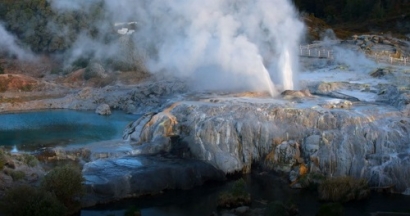
Marking the beginning of the 15-year research investment, a 7•2-meter high drilling rig broke ground on the site to form the first borehole for the observatory.
Over the next 15 months, the drilling team will create 12 boreholes of various depths, which will enable research into Glasgow's geology, its underground water systems and the potential for heat from the water in the city's disused coal mines. One of the biggest aims of the project is to find out whether there is a long-term sustainable mine water resource that could provide a low-cost, low-carbon heat source for homes and businesses.
Measurements will be taken from the boreholes, such as temperature, water movement and water chemistry. Environmental baseline monitoring of near-surface chemistry, gases and waters will also be measured.
Lord Henley, the Undersecretary of State at the government's Department of Business, Energy & Industrial Strategy, was joined by representatives from NERC and the British Geological Survey (BGS), who are leading the project.
The observatory is one of two sites proposed in the £31 million UK Geoenergy Observatories investment commissioned by NERC, the UK's leading funder for environmental sciences, and operated by BGS, the UK's principal provider of impartial geological evidence since 1835.
The Glasgow Geothermal Energy Research Field Site will enable the UK science community to study the low temperature mine water geothermal environment just below the Earth's surface.
Professor Zoe Shipton, Professor of Geological Engineering at the University of Strathclyde and Chair of the UK Geoenergy Observatories Science Advisory Group, said, “More and more of the solutions to decarbonizing our energy supply will need to come from beneath our feet. Ensuring we take forward these solutions in a sustainable way means understanding more about how the system works. The UK Geoenergy Observatories will build up a high resolution picture of the underground system, providing a breakthrough in our understanding. This hasn't been done anywhere else in the world. What we learn in Glasgow will lead the way in understanding how to balance our need for resources, with keeping people safe and protecting our environment.”
BGS will make data from the Glasgow observatory available online from 2019. Data is already being collected and interpreted - the core samples taken from the ground during the drilling process will become a key data source for the project.

